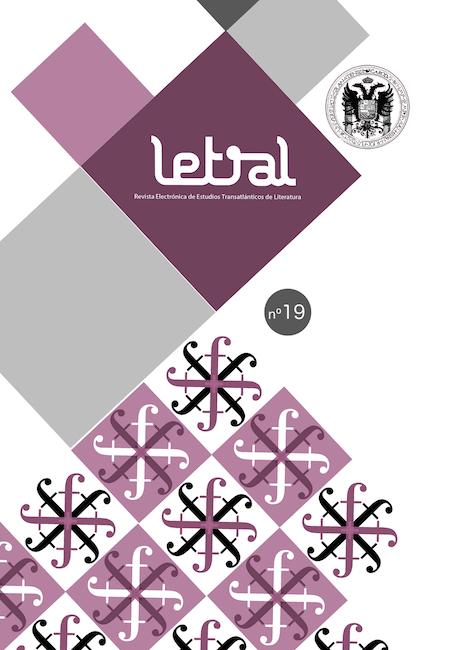Enrique Gómez Carrillo and the Poetic Split of Hispanic Modernism
DOI:
https://doi.org/10.30827/rl.v0i19.6671Keywords:
Hispanic Modernism, Fin de Siècle, Parnassianism, Decadentism, Symbolism.Abstract
Beyond his controversial reputation as a novelist and official historian of the Fin de Siècle literary system, the Guatemalan poet Enrique Gómez Carrillo (1873-1927) has scarcely been vindicated as the first thorough theorist and main popularizer of the French poetic trends of Decadentism and Symbolism. From his first book Esquisses (1892) to the important year of 1898, no one like him promoted, as a privileged Parisian observer, an expressive renovation of Modernism, its authorial canon and its repertoire of symbolic and conceptual elements. Also, he acted as a guidance for Rubén Darío and with him, for all the Hispanic young poets to overcome the Parnassian models that had dominated poetry during the last decades of 19th century. Gómez Carrillo represents a time of Spanish literature that was marked by the continuous search of universality and modernity.
Downloads
References
“Ángel Guerra” (José Betancort Cabrera) (1899). “Sensaciones de arte”, en La vida literaria, nº 24, 385.
Bousoño, C. (1999). Teoría de la expresión poética. Madrid: Gredos.
“Clarín” (Leopoldo Alas) (1887). Apolo en Pafos (interview). Madrid: Librería de Fernando Fe.
--(1889). Mezclilla. Madrid: Librería de Fernando Fe.
--(1893). “Los Trofeos, por José María de Heredia”, en El Imparcial, 31/07/1893, 3.
Cruz, Manuel de la (1926). Obras de Manuel de la Cruz. Madrid: Biblioteca Calleja.
Díaz Romero, Eugenio (1913). Horas escritas. Buenos Aires: (s. n). Ferreres, Rafael (1975). Verlaine y los modernistas españoles. Madrid:
Editorial Gredos.
Gómez Carrillo, Enrique (1892). Esquisses. Siluetas de escritores y artistas. Madrid: Imprenta de la Viuda de Hernando y Cía.
--(1893). Sensaciones de arte. París: Imprimerie G. Richard.
--(1893). Cuentos escogidos de los mejores autores franceses contemporáneos. París: Casa Editorial Garnier Hermanos.
--(1894). Cuentos escogidos de los mejores autores castellanos contemporáneos. París: Casa Editorial Garnier Hermanos.
--(1895). Literatura extranjera. Estudios cosmopolitas. París: Librería de Garnier Hermanos.
--(1898). Almas y cerebros. Historias sentimentales e intimidades parisienses. París: Garnier Hermanos, Editores.
--(1900). Sensaciones de París y de Madrid. París: Garnier Hermanos Editores.
--(1902). El alma encantadora de París. Barcelona: Editorial Maucci.
--(1905). El modernismo. Madrid: Librería de Fernando Fe / (1914) 2ª edición aumentada y corregida: Madrid: Francisco Beltrán, Librería Española y Extranjera.
--(1910). Pequeñas cuestiones palpitantes. Madrid: Librería de los Sucesores de Hernando.
--(1919). Treinta años de mi vida. Libro 2º: En plena bohemia. Tomo XVI de las Obras Completas. Madrid: Editorial Mundo Latino.
Henríquez Ureña, Max (1954). Breve historia del modernismo. México: Fondo de Cultura Económica.
Palenque, Marta (2002). “Salvador Rueda, director de la Gran Vía (18941895) y la renovación poética finisecular”, en España contemporánea: Revista de literatura y cultura 15, 1: 31-54. DOI: https://doi.org/10.12795/PH.2001.v15.i01.16
Pardo Bazán, Emilia (1893). “Sensaciones de arte, por E. Gómez Carrillo”, en Nuevo Teatro Crítico n.º 30: 74-81.
Pérez Petit, Víctor (1896). “Enrique Gómez Carrillo: Literatura extranjera”, en Revista Nacional de Literatura y ciencias sociales 25, 2: 1-4.
Rivera-Rodas, Óscar (1988). La poesía hispanoamericana del siglo XIX. Madrid: Alhambra.
Sáez Martínez, Begoña (2004). Las sombras del modernismo. Una aproximación al Decadentismo en España. Valencia: Institució Alfons El Magnànim.
Urrutia, Jorge (2004). Las luces del crepúsculo. El origen simbolista de la poesía española moderna. Madrid: Biblioteca Nueva.
Downloads
Published
How to Cite
Issue
Section
License
Revista Letral is an open access journal under a Creative Commons Atribución-NoComercial 4.0 license.
The works published in this journal may be reused, distributed and publicly presented for non-commercial purposes, provided that: cite the authorship and the original source of the publication (journal, publisher and URL of the work).
We strongly recommended you to share our published articles in social and scientific networks, institutional and public repositories, personal or institutional websites, blogs, Google Scholar, ORCID, ResearchID, ScopusID, etc.
The journal allow the author(s) to hold the copyright and to retain publishing rights without restrictions.
We are completely free, both for readers and authors.














